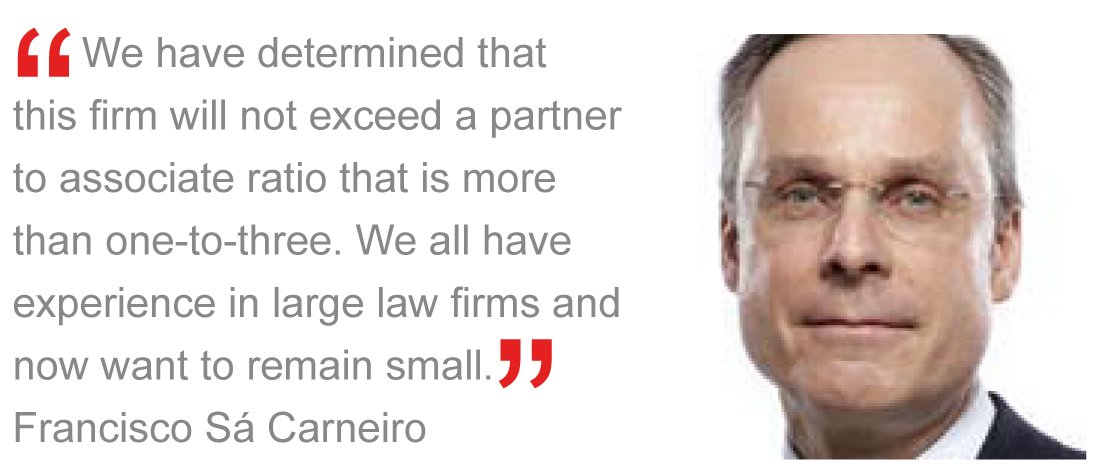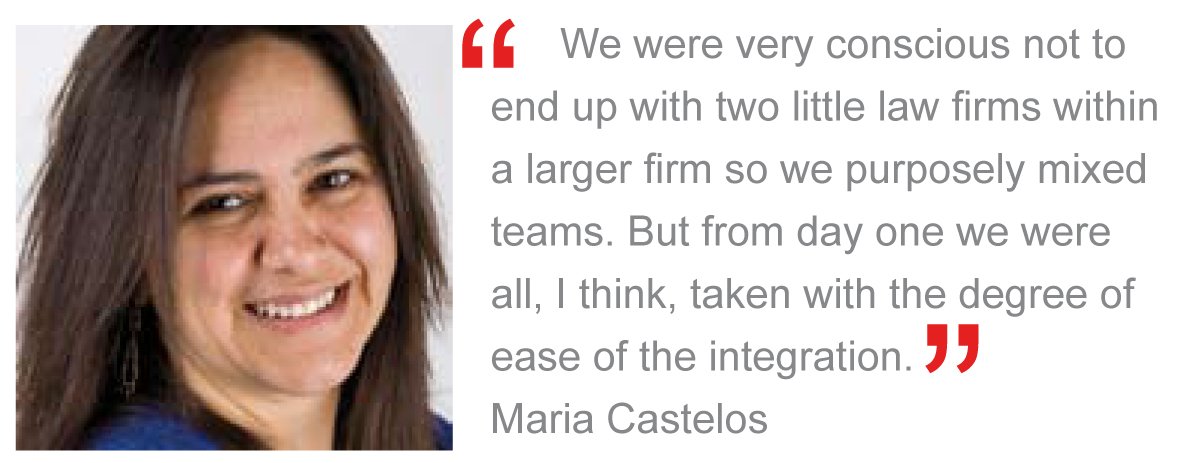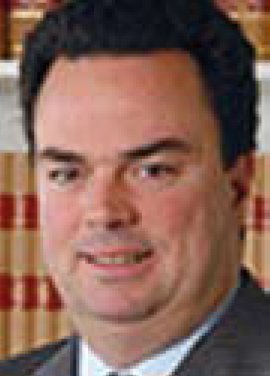A partnership of equals – Campos Ferreira, Sá Carneiro & Associados
Dos de los abogados mercantilistas más destacados de Portugal han dejado los grandes despachos de Lisboa para crear un nuevo actor en el mercado legal portugués: Campos Ferreira, Sá Carneiro & Associados (CS Associados). Se trata de un despacho deliberadamente pequeño pero que ya compite con los grandes del mercado.
Campos Ferreira Sá Carneiro & Associados (CS Associados) was born from the combination of a team of three Uría Menéndez partners – Bernardo Abreu Mota, Duarte Brito de Goes and Lisbon Co-Managing Partner Francisco Sá Carneiro – and three PLMJ partners – Maria Castelos, Martim Morgado and former Managing Partner Fernando Campos Ferreira. The firm officially launched in spring 2010 and, a year on, from its elevated offices on Avenida da Liberdade in Lisbon now overlooks much of the local competition.
Some question however, whether the firm’s creation is indicative of a changing demand for new law firm models, or merely a twist of fate. Despite the timing of the departures there was no master plan by the six to form a new firm, insists Sá Carneiro. “There is never a good or a bad time to launch a new firm but for us it was merely the right time.”
Undoubtedly he and Campos Ferreira have huge reputations in the market, but it was their shared values that brought them together. Both have an attraction for Patek Phillipe watches, and the craft and dedication that goes into their manufacture also perhaps reflects their own take on the legal profession. However the decision to leave Uría Menéndez was not easy, admits Sá Carneiro, having merged his own office Vasconcelos F. Sá Carneiro, Fontes & Associados into the firm in 2004, then still under the leadership of Rodrigo Uría, of whom he speaks fondly.
“Ultimately however it was simply not possible for any of us to continue what we were doing, and all we knew was that whatever law firm we moved on to it would be very different to that we had left behind,” he says.
For Campos Ferreira, the decision was equally tough, having already moved aside from a leadership position following the return of founding partner Luís Sáragga Leal to a management role. A desire for greater personal autonomy was never an issue, all insist. Both Sá Carneiro and Campos Ferreira already maintained prominent roles, and all the partners worked with their own clients and managed them independently.
Limited partnership In creating their own law firm project, and in a market where size seemingly matters, the challenge is to avoid some of the issues they say characterised their prior firms.
In creating their own law firm project, and in a market where size seemingly matters, the challenge is to avoid some of the issues they say characterised their prior firms.
“We were very conscious not to end up with two little law firms within a larger firm so we purposely mixed teams. But from day one we were all, I think, taken with the degree of ease of the integration,” says Maria Castelos, formerly Head of PLMJ’s Banking and Finance practice, and who was considered one of its brightest young stars.
“For the wellbeing of everyone we had reached a point where we had to do something new,” she adds. “As individuals we had all worked alongside one another but once the idea of working collectively was raised it proved unanimously attractive. To our minds, three plus three would make much more than six.”
What the firm does differently, they say, is to focus on clients’ desire for proximity and to offer senior lawyer input in virtually every matter – goals that inevitably impose limits on both its size and structure.
“We have determined that this firm will not exceed a partner to associate ratio that is more than one-to-three. We all have experience in large law firms and now want to remain small,” says Sá Carneiro.
CS Associados’ compact size, currently 22 lawyers, has not however diminished its ability to feature in many of the most high profile matters of the past year. Most publicly, acting for Brazilian cement group Votorantim – a former PLMJ client – involved in a protracted three-way battle for control of Portugal’s largest cement producer Cimpor.
Compromise
The size of the firm and the partners’ own experience inevitably also impacts on the types of work CS Associados is comfortabe with. To date, the core banking and finance, corporate and projects focus inevitably reflects the founding partners’ practice backgrounds.
“We are generalist lawyers but also very mindful of the limits of our own capabilities. We are able to divide matters between us but also careful about what we do take on,” says Castelos.
This inevitably requires compromise on the part of the partners although this understanding applies as much to potential new recruits as to client mandates. The firm may not be recruiting at the most junior levels but is still looking to add senior level expertise.
“We want to choose the right people, not only in the size of their book of business, but also that fit the team we already have. We want to work alongside people we enjoy being with,” says Sá Carneiro.
The addition of tax specialist António Rocha Mendes, a former Cuatrecasas Gonçalves Pereira Partner, is reflective of this measured approach. Senior lawyers are brought in first as Counsel before any permanent position may be offered. Senior Counsel João Maria Pimentel, who now leads the firm’s Restructuring and Insolvency practice, is the most recent arrival, having joined from Uría Menéndez where he was a Managing Associate.
“All the partners have to feel comfortable with any new additions. What is very important to all of us is that this is a true partnership,” adds Castelos.
She accepts that practice gaps potentially still exist – for example, public law or competition – but that the relationships the firm has already with individuals elsewhere fulfils all of their ongoing needs. If client demand dictates further practice expansion, then they will follow the same recruitment process.
 Success
Success
The firm’s first year may have gone well but nothing can be taken for granted, they insist. Nonetheless, virtually all of the teams’ existing clients moved with them although Uría Menéndez put up more of a fight than PLMJ to retain some key relationships, say well-placed sources.
“Our clients have proved very supportive, and important in this is the degree of attention we were perhaps already giving them,” says Castelos.
Much of the business development emphasis of the past year has however been focused beyond Portugal towards inbound referrals, they say. “International clients, and law firms, are inevitably more focused on firms’ brands but they like to know they have options, and there remains a lot of goodwill in our own personal relationships. Fundamentally also, we are not looking to cater to everybody, we do not want to sell mere legal ‘products’,” says Sá Carneiro.
The most significant benchmark of success for both remains however the decision of the partners’ own teams to move with them. “At first we could not offer our Associates a contract, office or guarantee of success, but nonetheless they all still came. It gave us all, I think, a huge degree of personal and professional satisfaction,” says Castelos.
One challenge remains in ensuring that viable career paths remain open to the firm’s junior lawyers. Both insist that there are no hourly targets for any lawyers within the firm, although they admit to monitor billed workload hours each year. There is also no Managing Partner, and all decisions are made jointly – a smaller structure again means fewer “management” issues, they say.
“What is important is that all the partners can sit around a single table and discuss issues. We may not all agree, and in fact there may be strong differences of opinion, but what is significant is that they are able to be aired. I have always wanted to be a lawyer first and a manager second,” says Sá Carneiro.
Experience
The firm’s compact size is well-suited to the challenges the Portuguese economy currently faces, they believe. The complexity of the issues now facing businesses demands the input of more experienced lawyers.
“Areas such as acquisition finance and the capital markets are clearly dead, and for investment banking-led deals there is a reluctance to invest in Portugal given the uncertainty that surrounds the national finances. There is a sense among international clients that Portugal presents risks,” says Castelos.
But uncertainty means greater demand for legal and risk management and there remains room in every legal market for a high-end independent corporate and finance firm, they believe. And unlike the other leading firms in the market, CS Associados remains content to focus on Portugal. There is no desire to expand into Africa or Brazil, as others are doing.
“What is significant for all of us is the degree of proximity we have with our clients and the level of senior lawyer-level involvement. We recognise that this will impact on the level of profits the firm can generate, but again we are all very comfortable with this. We are not looking to build a franchise,” says Sá Carneiro.
The continuing challenge, say competitors, will be to build an institution that – like Patek Phillipe in their famous father and son advertisements – will continue to benefit the firm’s future generation.












